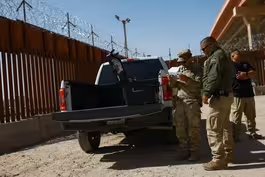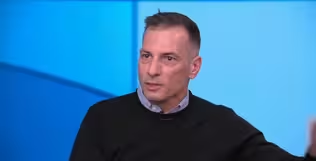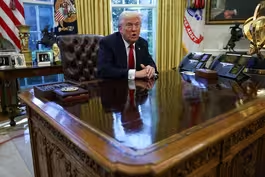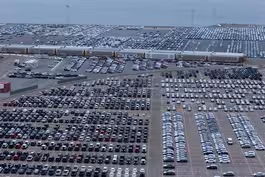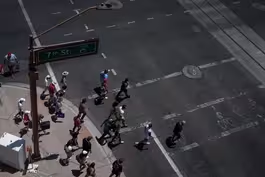
Tariffs, cuts complicate life for some who voted for Trump
Clip: 3/27/2025 | 6m 48sVideo has Closed Captions
Trade wars, federal cuts complicate lives of some Nebraskans who put Trump back in office
President Trump’s sweeping measures, from tariffs to federal worker cuts, are taking shape in Washington, but their impact is already rippling far beyond. Lisa Desjardins visited rural Nebraska where livelihoods are on the line.
Problems playing video? | Closed Captioning Feedback
Problems playing video? | Closed Captioning Feedback
Major corporate funding for the PBS News Hour is provided by BDO, BNSF, Consumer Cellular, American Cruise Lines, and Raymond James. Funding for the PBS NewsHour Weekend is provided by...

Tariffs, cuts complicate life for some who voted for Trump
Clip: 3/27/2025 | 6m 48sVideo has Closed Captions
President Trump’s sweeping measures, from tariffs to federal worker cuts, are taking shape in Washington, but their impact is already rippling far beyond. Lisa Desjardins visited rural Nebraska where livelihoods are on the line.
Problems playing video? | Closed Captioning Feedback
How to Watch PBS News Hour
PBS News Hour is available to stream on pbs.org and the free PBS App, available on iPhone, Apple TV, Android TV, Android smartphones, Amazon Fire TV, Amazon Fire Tablet, Roku, Samsung Smart TV, and Vizio.
Providing Support for PBS.org
Learn Moreabout PBS online sponsorshipGEOFF BENNETT: President Trump's sweeping measures, from tariffs to federal worker cuts, are taking shape in Washington, but their impact is already rippling far beyond the Capitol.
AMNA NAWAZ: Correspondent Lisa Desjardins traveled to red state Nebraska, where livelihoods are on the line.
LISA DESJARDINS: As each day starts in rural Nebraska, Lindsey Nielsen makes breakfast, a gets her kids out the door... LINDSEY NIELSEN, Clinical Microbiologist, FDA: Love you, sweetie.
Bye.
LISA DESJARDINS: ... and drives her youngest to school.
And that is where, these days, the normal routine ends, thanks to an e-mail she read to us.
LINDSEY NIELSEN: "Your ability, knowledge, and skills do not fit the agency's current needs, and your performance has not been adequate."
LISA DESJARDINS: Lindsey was fired from her job at the FDA, then temporarily reinstated by a court order.
She's now on administrative leave.
What's it feel like even reading that now?
LINDSEY NIELSEN: It's still very, very hurtful.
It's a lie, completely.
LISA DESJARDINS: Her performance reviews portray a top employee in a microbiology job affecting millions, approving tests for COVID, the flu, and other fast-moving and changing diseases.
Like nearly 60 percent of Nebraska, she voted for Trump and initially was glad he won.
LINDSEY NIELSEN: What happened afterwards, though, is not something I expected.
I did not expect there to be such a massive, quick, rash cut to the federal government.
I really expected it to be logical.
LISA DESJARDINS: She and her husband are veterans and serve in the Army Reserves.
They're also both federal employees, accepting multiple moves and lower pay as the price of public service.
What would it mean if both of you all are RIFed, or terminated?
LINDSEY NIELSEN: It means that we both will find new jobs.
I think we will bounce back.
I can't say that about some other people I know.
We go to church with some other people that work for the USDA and they're very worried.
LISA DESJARDINS: They're not alone.
Nebraska is home to more than 17,000 federal employees.
Per capita, that's a bit below the national average, but the U.S.
Postal Service and military are two of the state's biggest employers.
At the same time, it is a conservative state.
ERIC THOMPSON, Economist, University of Nebraska-Lincoln: I'd say it's a state that wants a smaller federal government.
LISA DESJARDINS: Eric Thompson is an economist with the University of Nebraska-Lincoln.
ERIC THOMPSON: It's a college town, to some extent.
LISA DESJARDINS: He says Trump's actions aren't felt widely here yet, that some things like cuts to taxes and government spending could help Nebraska's economy.
ERIC THOMPSON: I think the problematic policies are the tariff regime and also the limits on legal immigration.
Legal immigration is really important for our economy, certainly in this state.
LISA DESJARDINS: Last year, 37 percent of Nebraska's state budget came from the federal government.
That includes Medicaid, research grants, roads and bridges.
But one of the biggest areas watching Trump's policies is the ag economy.
SCOTT THOMSEN, Nebraska Farmer: When you're looking at your margins and your rate of return, you're squeezing pennies.
LISA DESJARDINS: Outside Nebraska's other big city, Omaha, Scott Thomsen's farm roots stretch back over three generations.
He says farm families like his are used to a bumpy financial ride.
Was there a point you thought about getting out?
SCOTT THOMSEN: Oh, yes, usually five days in the summer and five days in the winter.
(LAUGHTER) SCOTT THOMSEN: The tech has evolved, but not the seasons.
Every spring, he fertilizes his fields that will grow corn and soy.
That produce and the cattle he raises put the family farm and much of the state at the center of the president's trade war.
DONALD TRUMP, President of the United States: I'm going to be much more lenient with regard to the tariffs that you will see on April 2.
I'm going to be much more lenient than they were with us.
LISA DESJARDINS: Trump has already sparked a tariff battle with China, possibly hurting farmers' demand.
And he's threatened Mexico and Canada, which could further spike key supply prices, like for fertilizer.
But Scott hasn't seen that yet.
SCOTT THOMSEN: So far, as bad as it's made to be sound, it really hasn't been a sledgehammer, because he's backed off our Mexico, Canada trade tariffs two times now.
LISA DESJARDINS: This year, he's locked in a strong crop insurance rate, allowing him to bank on income from his fields even if the market turns.
He likes what Trump and Elon Musk are doing to cut government and shift the trade balance.
He also knows there's a risk to farmers.
But you're hopeful.
SCOTT THOMSEN: Absolutely.
LISA DESJARDINS: Why is that?
SCOTT THOMSEN: We have already been through this once.
We went through it in 2020.
And it was a hand grenade that went off that time, and the prices fell out of bed.
Made it through.We were subsidized by the government, basically the loss of what they thought the trade, the tariffs impacted the price.
And it ended up being a really profitable year for farmers.
LISA DESJARDINS: Back in Lincoln, freshman college student Asraa Al-Lami faces a major loss.
The teaching student and native Nebraska's scholarship has been frozen and may be canceled.
She describes herself as apolitical, didn't vote last year and never expected Washington politicians would get involved in her education.
ASRAA AL-LAMI, Student, University of Nebraska-Lincoln: They just feel so far from us.
Like, the government isn't something that I feel like -- a lot of people say, oh, it's not going to affect my day-to-day life.
It's not going to affect me and stuff.
LISA DESJARDINS: It feels far away.
ASRAA AL-LAMI: Yes, it just feels like something that's so unreal.
and for me, it's like, now it just feels so real.
LISA DESJARDINS: Asraa, who helps at an after-school program for teens, is part of the RAICES Scholars Program, a federally funded program in Nebraska that aims to fill the state's teaching shortages by training local students for the job.
But the Trump administration recently pulled its share of the program's funds because the school's grant application referenced diversity.
ASRAA AL-LAMI: You had to be from Nebraska.
It was literally just that you just had to want to be a passionate teacher and teach in your communities.
LISA DESJARDINS: Asraa does not know, no one does, if the scholarship will be reinstated for next year.
But she does know she can't afford to take on student loans on a teacher's salary.
ASRAA AL-LAMI: If we don't have those programs in support, like, how do we go about this?
We're just going to lose so much people.
We're going to stay in this teacher shortage.
It's just going to get worse and worse.
LISA DESJARDINS: Nebraska's political landscape is a patchwork of rural red dotted by a couple of big blue cities.
It's all 1,000 miles from Washington.
But like the first signs of spring, the first signs of Trump's actions are here.
And families, farmers and others are closely watching for what's next.
For the "PBS News Hour" in Eastern Nebraska, I'm Lisa Desjardins.
ACLU sues Trump for using wartime authority in deportations
Video has Closed Captions
Clip: 3/27/2025 | 8m 10s | ACLU attorney on suing Trump administration for using wartime authority for deportations (8m 10s)
Angelo Carusone on tracking Project 2025, right-wing media
Video has Closed Captions
Clip: 3/27/2025 | 8m 24s | Angelo Carusone on tracking Project 2025 and right-wing media (8m 24s)
Ex-FTC commissioner says firing threatens agency
Video has Closed Captions
Clip: 3/27/2025 | 6m 36s | FTC commissioner fired by Trump says move threatens agency designed to protect consumers (6m 36s)
How automakers are navigating Trump’s tariffs
Video has Closed Captions
Clip: 3/27/2025 | 6m 50s | How automakers are navigating Trump’s tariffs on imported vehicles and parts (6m 50s)
New development tests car-free living in sprawling cities
Video has Closed Captions
Clip: 3/27/2025 | 7m 39s | Development near Phoenix tests whether car-free living is sustainable in sprawling cities (7m 39s)
Providing Support for PBS.org
Learn Moreabout PBS online sponsorship
- News and Public Affairs

FRONTLINE is investigative journalism that questions, explains and changes our world.

- News and Public Affairs

Amanpour and Company features conversations with leaders and decision makers.












Support for PBS provided by:
Major corporate funding for the PBS News Hour is provided by BDO, BNSF, Consumer Cellular, American Cruise Lines, and Raymond James. Funding for the PBS NewsHour Weekend is provided by...
